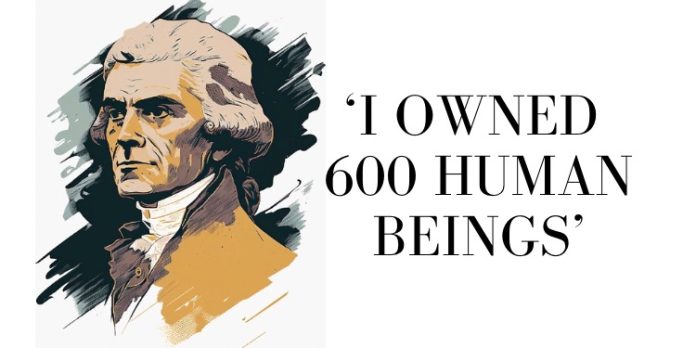White Supremacy is an Infected Sore
Perhaps the most falsely invented historical hero was Thomas Jefferson. “Life, liberty, and the pursuit of happiness” rings hollow when Jefferson owned at least 600 human beings (Whitehousehistory.org). Many textbooks mention that Jefferson owned slaves, but it is recorded as if it were only a minor point instead of a system that allowed racialized whites to murder, rape, and hang Blacks for any reason. “We the People” back then meant “We the white people.” This is real United States history. In fact, Jefferson supported the expansion of slavery across America at a time when the Native Americans were being slaughtered in mass by racist settlers. Jefferson may have claimed that he opposed slavery in public, but in private he was a super supporter of slavery as was the traitor Robert E. Lee. They both possessed human beings that they brutalized and sold.
The Black abolitionist David Walker once said that Jefferson should be remembered as the “greatest enemy of Black people.” Walker felt that whites would have a difficult time removing the racist sore that Jefferson spread. Walker said in 1829, “Disrespecting us have sunk deep into the hearts of whites, and never will be removed this side of eternity.” When whites refused the ideas of white superiority they too were subjected to oppression. John Brown was perhaps the greatest example of a White man that refused to accept the ideas of white supremacy and was called everything from “N-Lover,” to a crazy person. He was a brave hero to those that opposed slavery and white supremacy. One must remember that millions opposed slavery but did not have the political power to end it. Simply saying that everyone believed in slavery, or that it was the dominant system at the time, is a whitewash of history, for it ignores those that opposed it and the real reason for the Civil War and the Battle of the Alamo.
Capitalism did not create racism or slavery but it did enhance it as an institution. This legacy of hatred did not ever end. In the 1800s, the horror of being the “wrong skin color” included using Black babies as “alligator bait,” burning blacks alive, chopping up their bodies to feed hogs, pouring salt on wounds as torture, and stealing Black bodies from graveyards to cut up for doctors. Blacks were poisoned when they refused to pick cotton. Women were raped by slave masters and if pregnant the women might be whipped until the fetus fell from her body. At other times, when babies were born, they were sold by the pound. All honest historians must tell the good, the bad, and the ugly parts of the of the United States or otherwise they are dishonest to say the least.
You cannot have a just society unless these issues are exposed and taught to the public. Even now, racist scowled-faced politicians are trying to deny the horrors of slavery and white supremacy by banning books and trying to prevent Black studies from being taught. All must be taught so that this country can begin the long road to rid itself of racial hatred. Racism is not just part of the past; it is an indelible part of the present whereby many believe that “race” is a part of the natural world. Stop using the word “race,” there is only one. Instead use the word ethnicity. No “White” person should be offended by these facts unless they are bigots or misguided. Face it; everyone has negative relatives in their ancestry that might include vicious slave owners.









